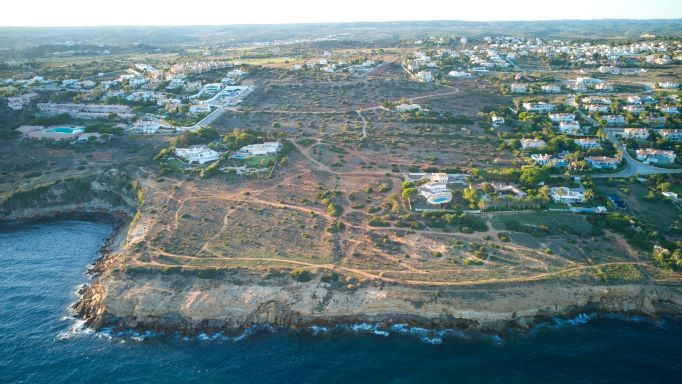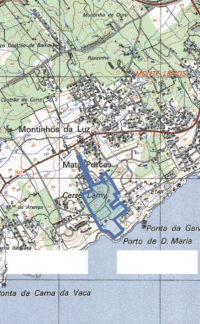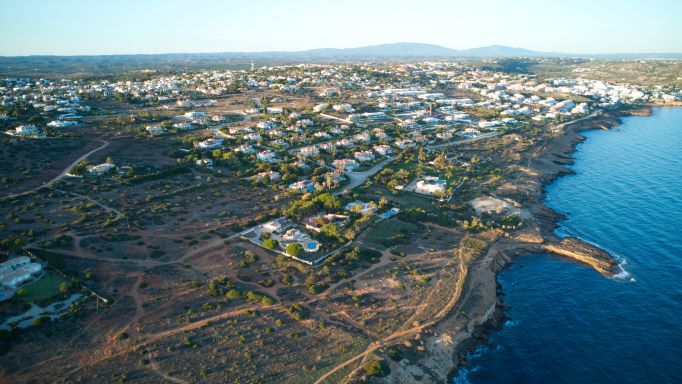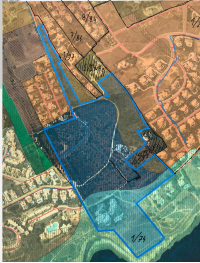AGAINST THE CHANGE OF LICENSING OF THE ALLOTMENT 1/74- QUINTA DO MAR, MATAPORCAS, LUZ

SUMMARY: The association is against the illegal change of licensing of the defunct allotment 1/74 from 1974.
The land in question is situated between Porto Dona Maria and the Reserva da Luz and is part of the ecologic reserve 90% green land in Praia da Luz. The original allotment was changed by the extraction of 3 plots over several years, making the intended change illegal. Already back in 1986 this allotment was considered expired by CML (Municipal Council of Lagos). Nevertheless, there is now an attempt of dismissal of this final decision and attribution of rights using a false master plan.
In conclusion, the Municipal Council of Lagos should deny this operation and kill this allotment.

DISCUSSION: The allotment approved in 1974 was already forgotten and shelved. It was
only registered on 11/20/2020 in a legally dubious manner. We say doubtful because it is not
possible to register an allotment when there are discrepancies in areas between the land to
be allotted and the allotment drawing area. Even though the allotment license expired in
1986, 3 property plots had been detached many years ago. It so happens that if the
drawings were now updated, excluding the 3 extracted plots, that no longer are part of it, this
would make the urban operation unfeasible because as ecological reserve, the law prohibits
any alteration. This legal prohibition complies with the ecological protection needs of the 21st
century. The land is in an ecological reserve and is 90% green as per the PDM (Municipal
Master Plan)- rules of Lagos. A less attentive observer would be struck by the fact that the
plan used to revive the allotment is false and does not correspond to the real area of the
land, thus hiding the alteration to the ecological reserve. The allotment covered 146,000.00
m2 in 1974, and now It has 110,880 m2. This makes the change in the licensing unfeasible,
since it is prohibited by law.
In an effort to justify the intended urban planning operation, the argument of acquired rights
is used. In other words, it is defended by the municipality that the license 1/74, despite never
having been registered, Is still in force, going as far as to issue a certificate of the existence
of a municipal resolution of October 1978. This resolution states the reception of
infrastructure works in a percentage of 80% of the total project. In this regard, it should be
said that in July 1978 the land was inspected and the municipal services informed that no
works had been carried out and that this reception would not be possible. Consequently, this
alleged council resolution was revoked in accordance with inf. L79/85 of 10/14/1985 and
401/85, both from the municipal services against the extension of the deadline to finish the
work, so the CML decided not to extend, cancelling the decision of 1978. This was replaced
by two new deliberations in two meetings of the Council, one in 07 /05/1986 confirming a
decision of 21/11/1985 where it was reported the complete degradation of the
infrastructures, only 10 percent of which had ever been done and not the 80 percent. There
is no doubt that even considering the minutes of 1978, the expiry of the allotment was
declared in 1986. This declaration revoked the alleged partial reception and confirmed the
non-compliance with the obligation to finish the urbanization works that was incumbent upon
the real estate developer. Furthermore, no guarantee had been given. As a result of the
Council’s decision of 21 November 1985, notified to CML on 2 December 1985, the
allotment permit of 1/74 is declared expired.
From 1985 to 1986, the CML sent several letters to the developer notifying him that a new
allotment could only be assessed and approved if a new infrastructure project was
presented. This would need to observe the new standards and rules. From 1986 to 2020
nothing appears to happen or was presented in the city council process file on the subject.
However, under the pretext of the 1978 minutes, the CML and the new property developer in
2021 entered into an urbanization contract for carrying out the urbanization works, based on 1978 project. This new owner bought the land from a bankrupted company and knew that
the allotment was not registered and that the process file mentioned that the allotment was
expired. It turns out that the urbanization works are legally an urbanistic operation
connected to another urbanistic operation that is mandatorily titled, which in this case would
always be the allotment operation approved in 1974, now expired.
It is unacceptable that the CML accepts the 1974 project to be executed as if all current
requirements in light of climate change and sustainable techniques and materials were in
place, forgetting that this is perpetuating the catastrophes we have seen recently. The
urbanization contract provided for the execution of works are obsolete in light of current
legislation and techniques. Based on this argument, we obtained an administrative embargo
(order to stop) on the execution of the works that were started in September 2022. Thus, the
renewal of license 1/74 always currently implies that the new law is complied with, since
acquired rights cannot now be invoked. Currently, the PDM of Lagos qualifies almost all the
land as an ecological reserve, which makes it impossible to build in. And even if the license
was in force, which is only accepted by us in an academic hypothesis, the municipality would
now have the bound duty to declare its expiry for reasons of public interest, since the works
were never effectively carried out or properly finalized.
In light of our success in the embargo and in ensuring that the urbanization contract was not
executed, the municipality recently allowed another attempt to create an appearance of
legality for the intended urbanization. It allowed the initiation of a procedure to change the
expired allotment, violating the PDM of Lagos and the new environmental protection rules.
As the law imposes when seeking a new license, this period of public discussion Is now in
force. In an effort of legal appearance, the municipality has obtained 4 unfavorable opinions
from the CCDR (Regional Coordination & Development Commission) in two months. CCDR
is the competent entity to supervise the ecological reserve. Only upon presentation of a false
drawing of the allotment plan, which includes the plots of land that were removed from the
allotment, was possible to receive a neutral opinion from this entity. It concludes that the
ecological reserve is not disturbed and therefore does not need its pronunciation. In total 5
opinions were requested in 2 months, with the last one obtained under a false submission.
The intended operation has significant environmental impacts, which require an
Environmental Impact Study (EIA) and subsequent Environmental Impact Assessment as a
condition for its authorization, under the terms of the Legal Regime for Environmental Impact
Assessment (RJAIA) established in Decree- Law No. 151-B/2013, amended by Decree-Law
No. 47/2014, Decree-Law No. 179/2015, Law No. 37/2017, Decree-Law No. 152-B/ 2017
and Decree-Law No. 102-D/2020; Law no. 75-B/2020, as it falls under subparagraph b) of
no. 10 — Infrastructure projects in Annex II, since it is an Urban Subdivision Operation that
occupies an area ≥ 10 hectares, whether it is a new license or a change of an existent license.
In Map 42 of the AAE (Strategic Environmental Assessment) Report, the area of the
Allotment Project in question is indicated as partially falling in the area of the Urban
Ecological Structure that is associated with the water lines present in the area. The Lagos
PDM classifies the land as ecological. Nothing is mentioned in the project about aspects
related to the management of surface and underground water resources. It is unacceptable
that the Municipality of Lagos makes the operation possible and could and should kill this
allotment. Allowing it is yet another ax on the planet and is the demonstration that the
competent authorities maintain the intention of ignoring the law and denying climate change.

The Associaçao Miradouro da Luz is campaigning to stop the construction of 29 villas on Reserva land at the site of one of the only remaining wild and open spaces in Praia da Luz. We believe this development is not legal. It does not comply with current planning laws, it does not meet the requirements of the Lagos Municipal Development Plan, and it will destroy the natural environment of P. Luz.
The site in question is between Reserva da Luz and Porto Dona Maria, along the cliff walk from Luz to Burgau. The development plan dates back to 1974, and in 1985 the Council declared that approval of this plan had expired. In 2021 the developer signed a contract with the Council to complete infrastructure works (roads, sewers, etc.) at the proposed development site. However, the works agreed upon were as per the infrastructure standards and methods of 1974, which in 2022 are considered obsolete and unacceptable. The proposed site is an ecological area. As the development license has expired, it is not legal for the developer to proceed with any such work. All new developments must comply with current regulations. On 30 September 2022, after our intervention, the Council quickly issued an “embargo”, effectively stopping all clearance work for 6 months. The Council justified the order by saying that the developer went far beyond the clearance of land for infrastructure works and began total land clearance destroying the natural habitat in areas not yet licensed.
We are asking the community and all visitors and people who care about Luz’s responsible development to help us fight this case. We urgently need funds to cover legal expenses to show the Council the illegality of this proposal and to take the case to court, if necessary. Funds are required to commission expert reports presented to the Council and the judicial courts and to publicize this campaign so we can be sure the wider community is aware of the proposed destruction of our environment. Please donate. Thank you for helping us preserve our natural environment.
Why are we against the 1/1974 allotment permit?
The allotment was intended to divide a land of over 60 000 m2 into fractions for construction purposes. The land in question is located between the urbanizations of Reserva da Luz urbanization and Porto Dona Maria. When the allotment was approved on January 9, 1974, it gave rise to about 53 lots.
There appears to be no site summary plan available as it is not included in the archive folders at CML (Câmara Municipal de Lagos), therefore the specifications and configurations of the lots are unknown. The permit has furthermore never been certified at the land registry. In 1984, a survey was carried out on the infrastructures created and it was found that the 10 per cent actually built had degraded completely. The state of infrastructure degradation was declared on October 24, 1984. On December 2, 1985, an extension of the deadline for the completion of the works was denied. On May 19, 1986, the license expired.
In September 2020 the current owner submitted, at the land registry office (Conservatória de Registo Predial de Lagos), the registration of an allotment permit including a new land division, while expressing the intention to still take advantage of the 1974 permit.
Now, we consider that for reasons of public interest, the City Council should immediately EXPLICITLY declare the 1974 subdivision as expired, recognizing the lack of infrastructure and the violation of the rules currently in force that prevent the renewal of the permit, such as the POOC Vilamoura-Burgau and PDM (Municipal director plan) of Lagos which classifies the entire terrain as ecological and natural. Any other understanding would violate the environmental and urban interests of Lagos and, in particular, of Vila da Luz.


